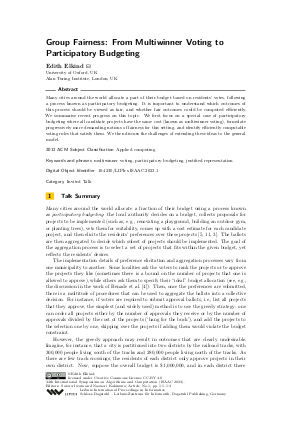Group Fairness: From Multiwinner Voting to Participatory Budgeting (Invited Talk)
Author Edith Elkind
-
Part of:
Volume:
34th International Symposium on Algorithms and Computation (ISAAC 2023)
Part of: Series: Leibniz International Proceedings in Informatics (LIPIcs)
Part of: Conference: International Symposium on Algorithms and Computation (ISAAC) - License:
 Creative Commons Attribution 4.0 International license
Creative Commons Attribution 4.0 International license
- Publication Date: 2023-11-28
File

PDF
LIPIcs.ISAAC.2023.1.pdf
- Filesize: 345 kB
- 3 pages
Document Identifiers
Subject Classification
ACM Subject Classification
- Applied computing
Keywords
- multiwinner voting
- participatory budgeting
- justified representation
Metrics
- Access Statistics
-
Total Accesses (updated on a weekly basis)
0PDF Downloads0Metadata Views
Abstract
Many cities around the world allocate a part of their budget based on residents' votes, following a process known as participatory budgeting. It is important to understand which outcomes of this process should be viewed as fair, and whether fair outcomes could be computed efficiently. We summarise recent progress on this topic. We first focus on a special case of participatory budgeting where all candidate projects have the same cost (known as multiwinner voting), formulate progressively more demanding notions of fairness for this setting, and identify efficiently computable voting rules that satisfy them. We then discuss the challenges of extending these ideas to the general model.
Cite As Get BibTex
Edith Elkind. Group Fairness: From Multiwinner Voting to Participatory Budgeting (Invited Talk). In 34th International Symposium on Algorithms and Computation (ISAAC 2023). Leibniz International Proceedings in Informatics (LIPIcs), Volume 283, pp. 1:1-1:3, Schloss Dagstuhl – Leibniz-Zentrum für Informatik (2023)
https://doi.org/10.4230/LIPIcs.ISAAC.2023.1
BibTex
@InProceedings{elkind:LIPIcs.ISAAC.2023.1,
author = {Elkind, Edith},
title = {{Group Fairness: From Multiwinner Voting to Participatory Budgeting}},
booktitle = {34th International Symposium on Algorithms and Computation (ISAAC 2023)},
pages = {1:1--1:3},
series = {Leibniz International Proceedings in Informatics (LIPIcs)},
ISBN = {978-3-95977-289-1},
ISSN = {1868-8969},
year = {2023},
volume = {283},
editor = {Iwata, Satoru and Kakimura, Naonori},
publisher = {Schloss Dagstuhl -- Leibniz-Zentrum f{\"u}r Informatik},
address = {Dagstuhl, Germany},
URL = {https://drops.dagstuhl.de/entities/document/10.4230/LIPIcs.ISAAC.2023.1},
URN = {urn:nbn:de:0030-drops-193038},
doi = {10.4230/LIPIcs.ISAAC.2023.1},
annote = {Keywords: multiwinner voting, participatory budgeting, justified representation}
}
Author Details
References
-
Haris Aziz, Markus Brill, Vincent Conitzer, Edith Elkind, Rupert Freeman, and Toby Walsh. Justified representation in approval-based committee voting. Social Choice and Welfare, 48(2):461-485, 2017.

-
Haris Aziz, Edith Elkind, Shenwei Huang, Martin Lackner, Luis Sánchez-Fernández, and Piotr Skowron. On the complexity of extended and proportional justified representation. In AAAI'18, 2018.

-
Haris Aziz and Nisarg Shah. Participatory budgeting: Models and approaches. Pathways Between Social Science and Computational Social Science: Theories, Methods, and Interpretations, pages 215-236, 2021.

-
Gerdus Benade, Swaprava Nath, Ariel D Procaccia, and Nisarg Shah. Preference elicitation for participatory budgeting. Management Science, 67(5):2813-2827, 2021.

-
Yves Cabannes. Participatory budgeting: a significant contribution to participatory democracy. Environment and urbanization, 16(1):27-46, 2004.

-
D. Marc Kilgour. Approval balloting for multi-winner elections. In Handbook on Approval Voting, pages 105-124. Springer, 2010.

-
Sonja Kraiczy and Edith Elkind. An adaptive and verifiably proportional method for participatory budgeting. In WINE'23, 2023.

-
Dominik Peters, Grzegorz Pierczyński, and Piotr Skowron. Proportional participatory budgeting with additive utilities. In NeurIPS'21, pages 12726-12737, 2021.

-
Dominik Peters and Piotr Skowron. Proportionality and the limits of welfarism. In ACM EC'20, pages 793-794, 2020.

-
Luis Sánchez-Fernández, Edith Elkind, Martin Lackner, Norberto Fernández, Jesús Fisteus, Pablo Basanta Val, and Piotr Skowron. Proportional justified representation. In AAAI'17, pages 670-676, 2017.

-
Brian Wampler, Stephanie McNulty, and Michael Touchton. Participatory budgeting in global perspective. Oxford University Press, 2021.

